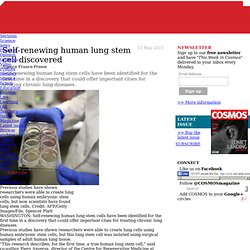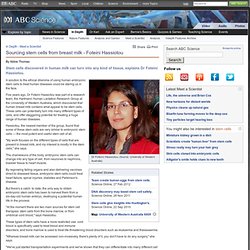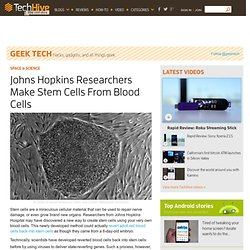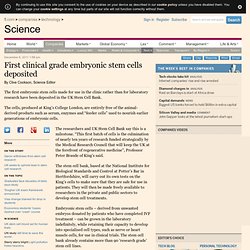

Self-renewing human lung stem cell discovered. Previous studies have shown researchers were able to create lung cells using human embryonic stem cells, but now scientists have found lung stem cells.

Credit: AFP/Getty Images/File, Spencer Platt WASHINGTON: Self-renewing human lung stem cells have been identified for the first time in a discovery that could offer important clues for treating chronic lung diseases. Previous studies have shown researchers were able to create lung cells using human embryonic stem cells, but this lung stem cell was isolated using surgical samples of adult human lung tissue. “This research describes, for the first time, a true human lung stem cell,” said co-author Piero Anversa, director of the Centre for Regenerative Medicine at Brigham and Women’s Hospital in Boston, U.S. Sourcing stem cells from breast milk - Foteini Hassiotou › Meet a Scientist (ABC Science)
In Depth › Meet a Scientist Stem cells discovered in human milk can turn into any kind of tissue, explains Dr Foteini Hassiotou.

By Abbie Thomas A solution to the ethical dilemma of using human embryonic stem cells to treat human diseases could be staring us in the face. Five years ago, Dr Foteini Hassiotou was part of a research team, the Hartmann Human Lactation Research Group at the University of Western Australia, which discovered that human breast milk contains what appear to be stem cells. These cells can potentially turn into many different types of cells, and offer staggering potential for treating a huge range of human diseases. Hassiotou, the newest member of the group, found that some of these stem cells are very similar to embryonic stem cells — the most potent and useful stem cell of all. "My work focuses on the different types of cells that are present in breast milk, and my interest is mostly in the stem cells," she says. ^ to top Insights into breast cancer.
Stem cells from fat win favor with heart researcher. Pro wrestlers no longer with us Former professional wrestler The Ultimate Warrior died Tuesday night at the age of 54, becoming the third pro wrestler to pass away this year.

The Ultimate Warrior, who legally changed his name to Warrior but was born Jim Hellwig, joins Big Daddy V... The Ultimate Warrior dead at 54 One of the most iconic and best known wrestlers of the past 25 years The Ultimate Warrior — who legally changed him name to Warrior and was born Jim Hellwig — passed away on Tuesday night. He was 54 years old. Pro wrestlers no longer with us Hit-and-run truck sought in Brevard death The driver of this pickup towing a trailer late Sunday in Cocoa is sought for questioning by the Florida Highway Patrol.
Vampires, nudists, snakes: Nobody does wacky like Florida Last week, news broke that a congressional candidate in Gainesville had a secret pastime: impersonating vampires. Gardiner's Coast to Coast bike trail becomes trade bait Lake Brantley vs. It could go one inning. John Hopkins Researchers Make Stem Cells From Blood Cells. Stem cells are a miraculous cellular material that can be used to repair nerve damage, or even grow brand new organs.

Researchers from Johns Hopkins Hospital may have discovered a new way to create stem cells using your very own blood cells. This newly developed method could actually revert adult red blood cells back into stem cells as though they came from a 6-day-old embryo. Technically, scientists have developed reverted blood cells back into stem cells before by using viruses to deliver state-reverting genes.
Such a process, however, can have disastrous side effects, like mutated genes or cancers. The new process developed by the Johns Hopkins researchers, as published in PLoS One, circumvents the risky need for viruses by using plasmids, rings of DNA that, according to Johns Hopkins, "replicate briefly inside cells and then degrade. " Once the plasmids attach themselves to the blood cells they insert four additional genes into the cell.
First clinical grade embryonic stem cells deposited. The first embryonic stem cells made for use in the clinic rather than for laboratory research have been deposited in the UK Stem Cell Bank.

The cells, produced at King’s College London, are entirely free of the animal-derived products such as serum, enzymes and “feeder cells” used to nourish earlier generations of embryonic cells. The researchers and UK Stem Cell Bank say this is a milestone. “This first batch of cells is the culmination of nearly ten years of research funded strategically by the Medical Research Council that will keep the UK at the forefront of regenerative medicine”, Professor Peter Braude of King’s said.
The stem cell bank, based at the National Institute for Biological Standards and Control at Potter’s Bar in Hertfordshire, will carry out its own tests on the King’s cells to make sure that they are safe for use in patients. They will then be made freely available to researchers in the private and public sectors to develop stem cell treatments.